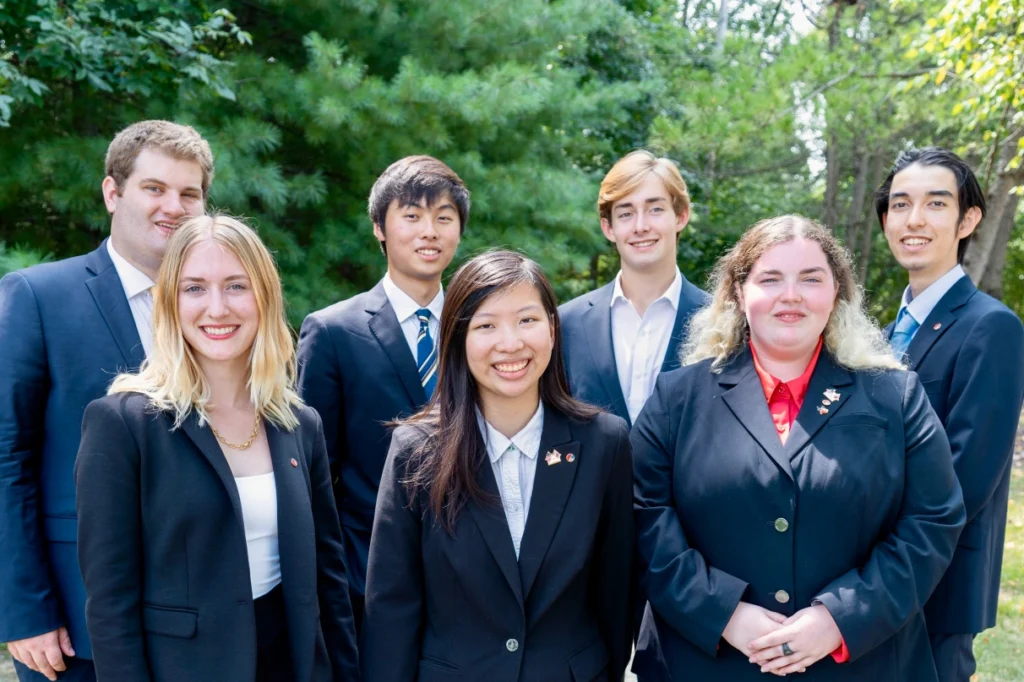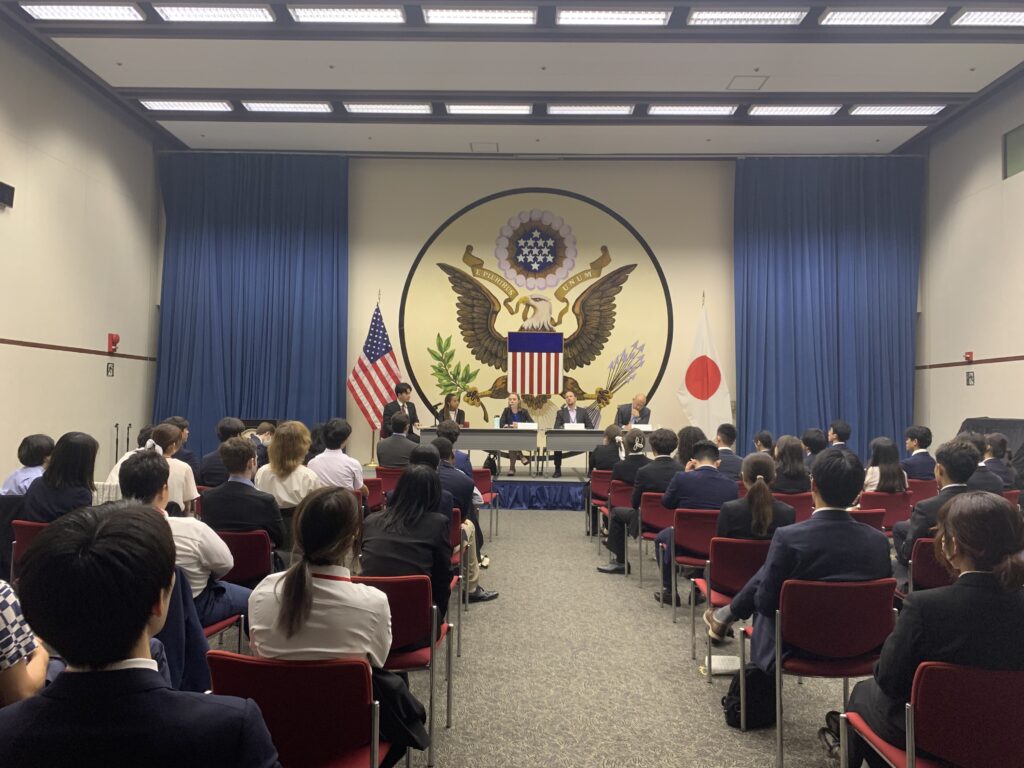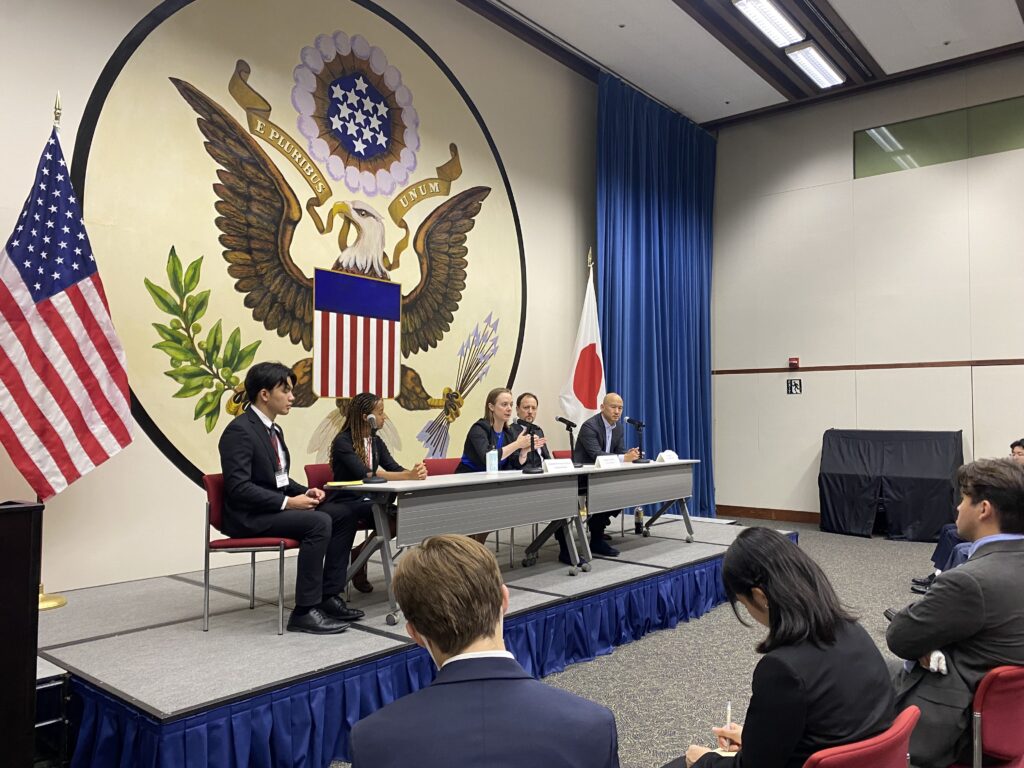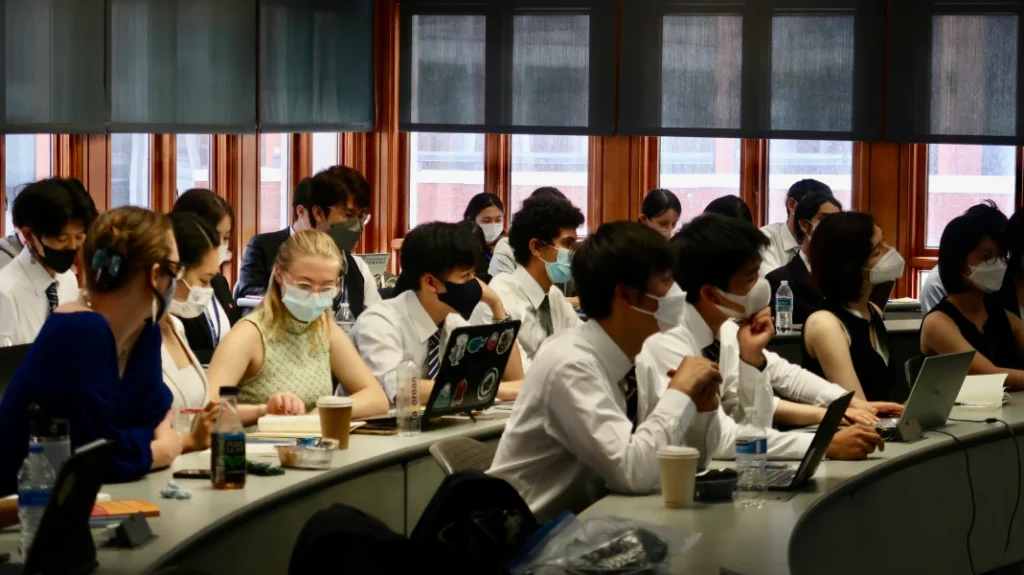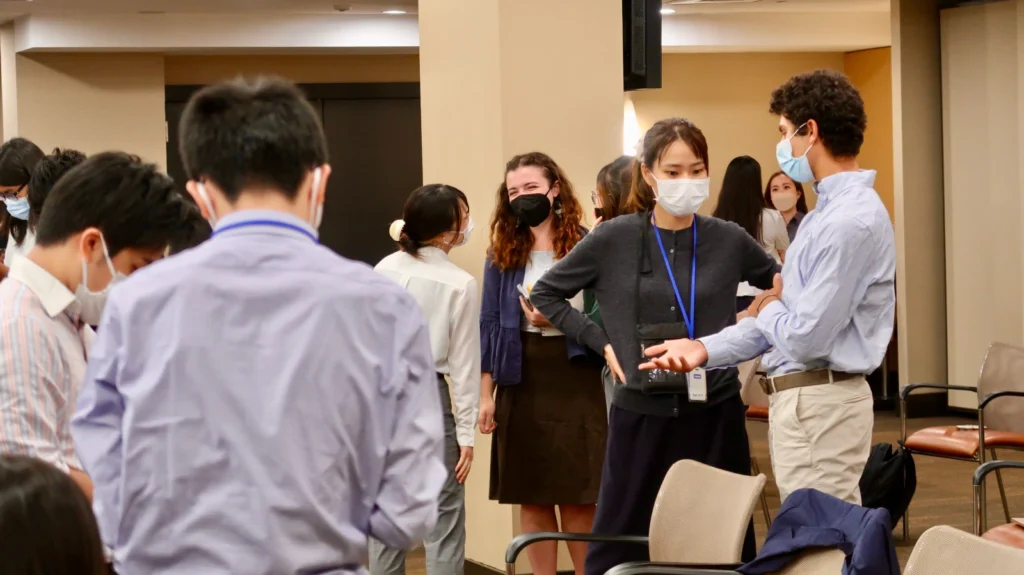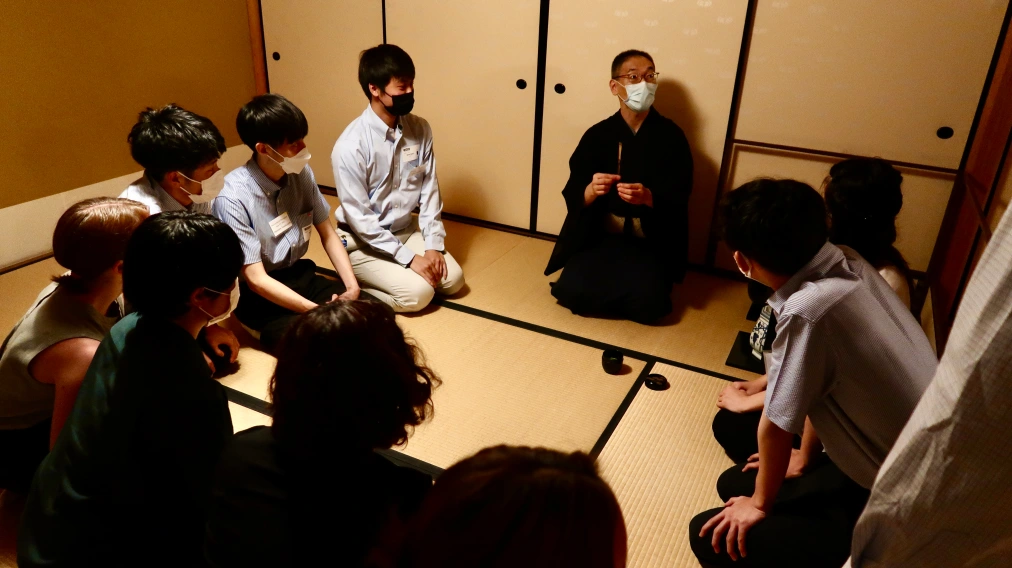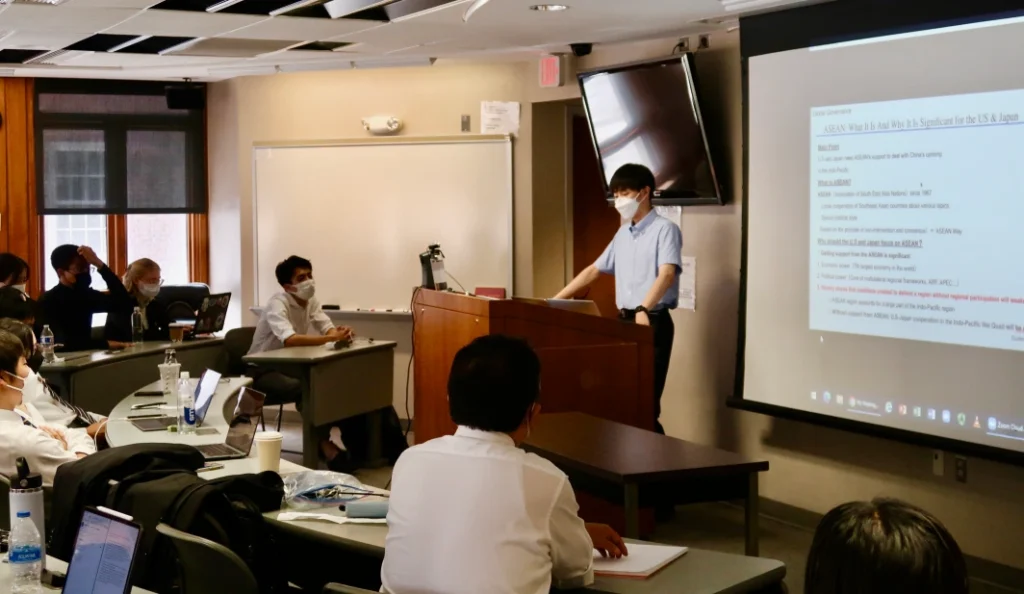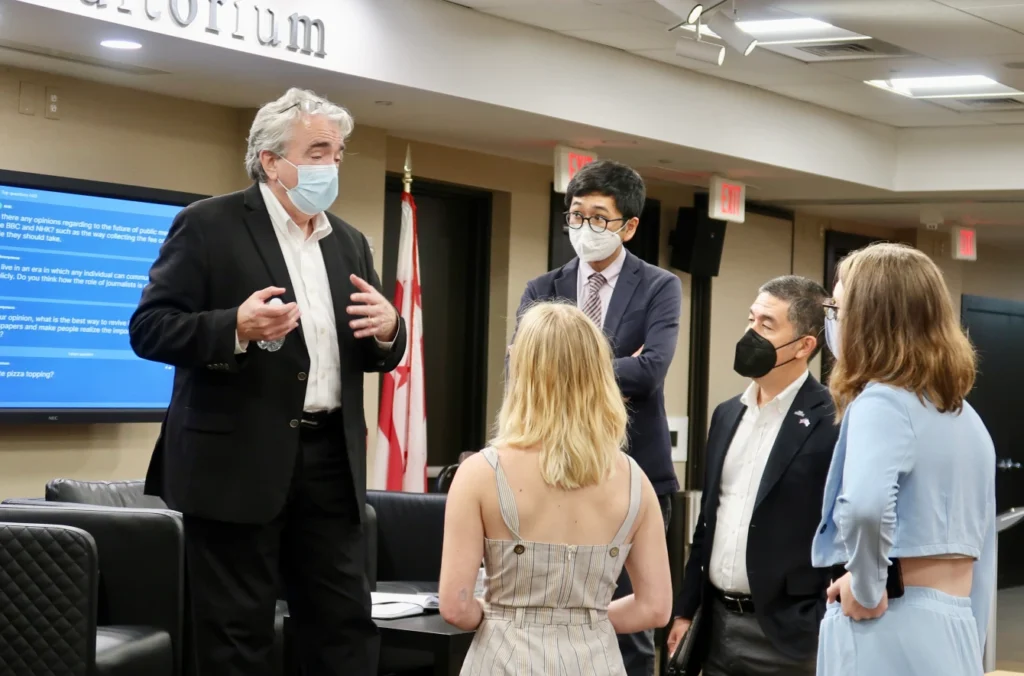Theme: “Foundations: Laying the groundwork for bilateral reflection and reimagination”
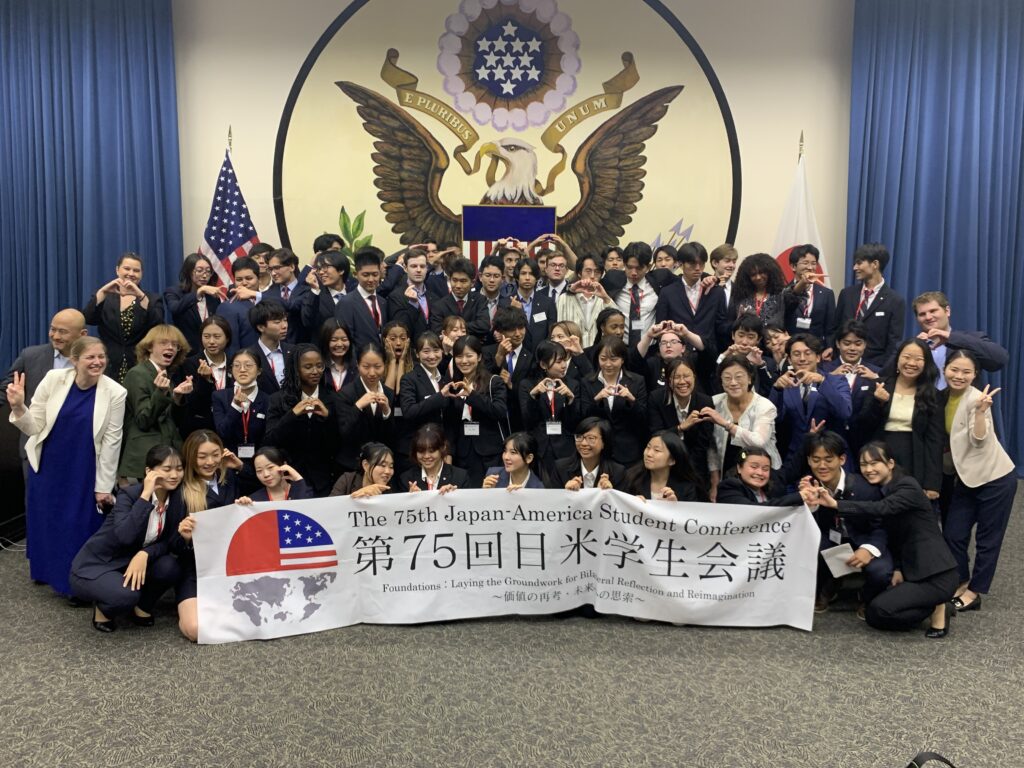
Summary
In 2023, the elected student Executive Committee of the 75th JASC selected the theme “Foundations: Laying the Groundwork for Bilateral Reflection and Reimagination” with the goal of not forgetting where the relationship began between our two nations and how it can grow more in the future. They wanted to challenge the delegates to take on new perspectives and build stronger relationships over the course of this year’s program and for many years after. From July 29th to August 26, 2023 the participants networked with their peers, challenged pre-existing conceptions/beliefs, and learned to take the perspectives of other individuals from different backgrounds into consideration when engaging in discussions.
Each year, JASC brings together an equal number of Japanese and American college students to participate in an academically rigorous and culturally immersive three-week-plus long summer program. In spite of the aftereffects of the COVID-19 Pandemic, the 75th JASC Executive Committee held the first in-person conference in Japan since the start of the pandemic. The 75th JASC brought together 71 motivated young leaders, with 35 students representing the United States as members of the American Delegation and 36 students representing Japan as members of the Japanese Delegation. During pre-conference orientation held in Los Angeles, delegates were able to interact with speakers and one another on a variety of subjects, bond with one another, and gain a more complex understanding of the U.S.-Japan relationship prior to the start of the conference.
With this year being a Japan year for JASC, the 75th delegation traveled across three sites, visiting Kyoto, Sasebo/Nagasaki, and Tokyo. These three very different sites each provided unique opportunities for the delegation to hear from scholars and leaders in their respective fields; to have in-depth discussions about modern/current issues; explore cultural differences while challenging stereotypes; and engage with history in culturally rich settings. Each site focused on a different thematic area. In Kyoto, the delegates focused on culture and beauty, examining topics such as Tradition and Innovation, Traditional Craftsmanship, Environmental Social and Governance (ESG) Investment, and Sustainable Business. In Sasebo, delegates engaged with locals to learn about the U.S.-Japan trade relations and military engagements. In these programs, delegates got to understand the delicate balance between port-sharing; international trade alliances; and historical sites relating to WW2. With Nagasaki, the focus was on World War 2 and the impact of the atomic bomb upon both countries. Delegates learned about the creation and utilization of the bomb, along with the victims created by its use and after-effects at the Nagasaki Peace Museum. While the experience was a solemn affair, it was indisputably the best at showcasing how history can be viewed and taught in two different ways. In Tokyo, law and diplomacy were emphasized through the embassy visits and showcasing of the interconnectedness of Japanese and American cultures in certain products and companies. Delegates were also treated to a special social program that focused on progressing gay rights in Japan. It was a particularly eye-opening experience that encouraged delegates to speak about “taboo” subjects.
JASC culminated with the annual Final Forum, which traditionally serves as a capstone for the conference, where delegates present to a group of distinguished guests and alumni on the conversations they have had and the research they have performed during the conference. JASC 75 utilized a hybrid format, opening the Final Forum open to the public both in person and online. The Forum welcomed Zoom guests from across the United States and Japan, along with several in-person guests and locals. During the Forum, delegates presented their research on different topics, including the legal reforms, perspectives of reality, and how culture can show history. Following the presentations, the floor was open to a Q&A session with the audience to ask a few questions before the next presentation was shown. In this manner, they were able to extend the opportunity to involve alumni, partners and supporters in this incredible event without lengthy lectures.
The 75th JASC Student Executive Committee, consisting of 16 Delegate-elected student leaders from Japan and the United States, showed their resilience, ingenuity, and resolve all throughout the planning process. With the mission, goals, and values of JASC and its 1934 Founders, the Executive Committee delivered a unique and incredible experience for its delegates. The conference culminated with Roundtable reflections, a talent showcase, and life-long bonds forged during the conference.
Sites and Programming
American Orientation: July 30-August 1, 2023
Kyoto: August 2-11, 2023
Kyoto, a city rich with culture. Nearly a thousand years since its emergence as the Heian capital in 794, Kyoto has continued to be the center of Japan. Surrounded by bountiful nature, Kyoto has produced countless hallmarks of Japanese culture. Take for example Kiyomizu Shrine and Byōdō-in Temple, the Nishijin textiles, maiko entertainers, or stories like The Tale of Genji and Pillow Book; Kyoto is home to a plethora of historical sites, works, and traditions. It is also home to the most long-established companies in Japan, and businesses such as Nintendo and Kyocera—considered pioneers of their times—are attracting attention as well. As such, at this site, we will discuss beauty, tradition, business, and globalization all centered on culture. As the first site of this conference, we hope that delegates will attempt to connect their sense of incongruity with respect to the values that can arise from cultural differences, how to relate to the opinions of others, and how differences in discussion styles, etc., to further learning. We would also like to consider the significance and future prospects for the arts and tourism, which are facing a difficult situation due to the COVID-19 pandemic.
Nagasaki: August 12-18, 2023
Located at the westernmost point of the Japanese mainland and in close proximity to continental Asia, since ancient times Nagasaki has functioned as the “window of Japan”, developing deep connections with foreign cultures. Remnants of this older history —whether regarding trade with European nations or the introduction and persecution of Christianity in Japan— can be felt and still color the city in the current day. Nagasaki also provides important insight into modern-era history with its role in Meiji-era industrialization and experience of atomic bombing. Additionally, with its mountainous and seaside geography and many islands, Nagasaki boasts a rich natural environment which on one hand supports industries like geothermal energy, forestry, and fishery, while on the other bringing about catastrophe in the form of natural disasters like the eruption of Mount Unzen-fugen. As the midpoint and second site of our conference, delegates will be able to appreciate the charm of Nagasaki as a regional site and engage in deepening discussions around a diverse set of topics such as natural environment, history and culture, or peace and national security.
Tokyo: August 19-26, 2023
Home to arguably the largest urban population in the world, Tokyo is a city that never sleeps, being the vanguard of Japanese society in many regards. Nagatachō, the heart of Japanese politics where central institutions like the National Diet Building and Prime Minister’s Office are located; Marunouchi, a financial hub where the major corporate players that drive the Japanese economy are lined up in office complexes; Shibuya, a fermenting ground for avante-garde and innovative ideas in pop-culture and fashion; Asakusa, where centuries worth of traditional culture and crafts have survived, passed down since the Edo Period; Tokyo’s appeal and influence is wide-reaching. Tokyo’s well-maintained world-class public transportation system that allows easy and safe access to these diverse locations is also another strength of the city. As our last site ,Tokyo will allow delegates of the 75th Japan-America Student Conference to heighten their creativity in these unique spaces while offering time for them to consolidate what they have gained from their experiences and reflect on their return to daily life.
Roundtable Topics
Culture and Arts: Perceptions, Cultural Expression, and Relationships
What comes to mind when you hear or read the word “culture,” and what does it mean to you? Why might an action or behavior be considered polite in one culture, but extremely rude in another? How do people express themselves through culture, and how does that impact or reflect on society? This roundtable will mainly focus on the interrelationships between “culture and arts” and “people and society,” as well as the role of culture and arts in US-Japan relations. We will explore various facets and types of cultures and arts as well as how they influence societies, groups, and individuals (and vice versa). Through research, fieldwork, and discussion of diverse topics and themes including soft power (e.g., cuisine, pop culture), modernity, subcultures, and cultural differences, we aim to increase our understanding of culture and arts, their impact on and reflection of people and society, as well as the role they play in our relationships.
Environment and Technology: Dualities, Synergies, and Apophenia
The Environment & Technology Roundtable aims to explore humanity and the natural world as dualities, synergies, and apophenia, without becoming pigeon-holed in any one topic or perspective. This RT will explore different facets of environmental and technology based subjects in a cross-disciplinary, interdisciplinary, and meta-oriented manner. This can include topics such as ecotourism, climate justice, intergenerational ethics, environmental policy, SDGs, epidemiology, biotech, EVs, infrastructure, transportation, and architecture. Roundtable members will have a say in determining the agenda. Welcome to the Environment and Technology Roundtable.
International Politics and U.S.-Japan Relationship: Opportunities and Challenges in the Global Community
World peace has become unstable and uncertain. Russia’s invasion of Ukraine has sent shockwaves throughout the world. In the Indo-Pacific region, the conflict between the U.S. and China is intensifying, and tensions are rising in the Taiwan Strait and the South China Sea. Threats are also diversifying as cyber security, economic security, and energy security are becoming increasingly important. In order to consider ways to solve the increasingly complex global problems that we face today, we must understand state behavior as being heavily influenced by factors including historical context, international norms, and domestic politics. Therefore, the goal of this Roundtable is to analyze international politics and global issues from these different perspectives, while also exploring where national interests of the United States and Japan converge and diverge.
Law and Morality: Legitimacy, Loopholes, and Humanity
The impact of Russia’s invasion, the current state of the United Nations, military, abortion, gun regulations, environmental regulations, diversity, workplace atmosphere, and the death penalty are some of the many topics that have recently become debatable in Japan and the United States. All of these have to do with the law, and at the same time, how we think about things from the values and morals that we hold within ourselves or the identities we associate with. Our sense of values shape our society, and sometimes our sense of values are subconsciously created by the laws that are enacted. In this roundtable, we are going to discuss how the laws of both countries’ societies influence the world we live in today, and how those actions shape our moral outlooks/values on situations. Laws and moralities of society can become both a help or a hindrance. So to those who don’t know the law, and even those who do, please join us in examining the rules that have already been established, and our values regarding topics of interest to the RT.
Linguistics and Philosophy: Love, Friendship, and Trust–Thinking Critically About the Foundation of Human Relationships
In this roundtable, we will use perspectives from linguistics and philosophy to consider the foundation of relationships such as love, friendship, and trust. From the U.S.-Japan relationship to individual connections, how are diverse relationships like these maintained? Is there really an ideal form of love and friendship? Why do people trust each other? Can artificial intelligence and humans build relationships? Why has trust in science wavered? Taking perspectives such as ontology and semantics as the starting point of our thinking, we will discuss the ambiguous and ever-changing “relationship” between Japanese and U.S. society, weaving in topics beyond the framework of the humanities, such as artificial intelligence and medicine to hone our skeptical eyes and our ability to grasp the essence of different subjects.
Social Class and Diversity: Critical Understandings and Transformations of Normative Values
People’s identities are held up by certain understandings and assumptions that they may instinctively feel, yet struggle to explain. How do people come to feel belonging to “class” or a “nation”? What does it mean to live in a “diverse” society? What do these terms mean to us in the current day, and have they held multiple meanings across different geographies, cultural spaces, and historical contexts? The present is rife with a multiplicity of ideologies that are often taken for granted, yet greatly shape people’s conceptions of themselves, others, and the lived environment they inhabit. Through looking at a wide range of topics, from パパ活 (papa katsu) and sugar daddy culture, educational inequality, or conceptions of technology and science, this roundtable aims to render visible various frameworks of social belonging, dissecting how they function as systems, understanding how certain social relations are experienced and reproduced, and identifying the forces that they have been molded by.
Sustainable Business: Understanding Investment and Innovation for the 21st Century
In the last few decades, businesses have been confronted with a rapidly changing climate, progressive social movements, backlash to globalization, and turbulent economic conditions. To that end, we have to change the business environment, strategy, and sometimes management philosophy. But is a company’s value really measured solely by maximizing profit? In the 21st century, should corporate social responsibility (CSR) and sustainability be required of businesses? This RT will discuss the evolution of existing companies and industries, explore the role of business in societal progress, and pursue ideas that achieve a sustainable society while fostering innovation and investment.
JASC 75 American Executive Committee
| Name | University | Major | Class |
| Shun Sakai(Chair) | Duke University | Electrical Engineering and Computer Science with a concentration in Machine Learning | 2025 |
| Charles Campbell(Vice Chair) | University of Virginia | Public Policy and Economics | 2025 |
| Levi Cannon(Japanese Executive Committee Liaison) | Vassar College | History and Asian Studies | 2025 |
| Melody Lau(Publicity and Technology Chair) | University of Arizona | Ecology and Evolutionary Biology and East Asian Studies with minors in History and Japanese Language | 2023 |
| Krislyn Massey(Recruitment Co-Chair) | University of North Texas | Japanese and International Studies with a Concentration in National Security and Diplomacy | 2024 |
| Helen Cecile Nowatka(Finance and Logistics Co-Chair) | Lewis & Clark College | Asian Studies, Chemistry, and Religious Studies | 2023 |
| Adam Riley(Finance and Logistics Co-Chair) | University of Wisconsin-Madison | International Public Affairs | 2024 |
| Ashley Xia (Recruitment Co-Chair) | Washington and Lee University | Japanese and Global Politics | 2024 |

